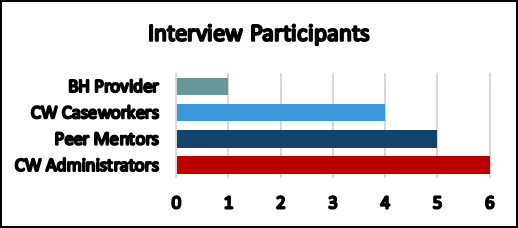During spring and summer 2018, the evaluation team conducted 16 interviews with various OhioSTART staff representing 6 counties, in order to assess perceptions of the program and guide further implementation. Overall, the interviews reveal staff have positive perceptions of the OhioSTART model. While we are currently drafting a full report, we wanted to highlight some preliminary findings.
OhioSTART is good for the child welfare system
- The model is influencing the child welfare system via an intensive, positive, and supportive approach to working with families experiencing substance use disorders and child welfare involvement.
“I think that it’s motivating for caseworkers to see that parents, some of which were involved with our agency, do recover. They’re able to get their children back.”
–Child Welfare Administrator
- Ohio START has resulted in increased and rapid communication and coordination of families’ services between child welfare staff and behavioral health providers.
“We are just having a lot more open communication with [AOD providers] than in the past and it is very helpful.”
–Child Welfare Administrator
Peer Mentors are key to the success of the program
Peer Mentors are not only providing intensive and supportive services and modeling recovery for parents, but they are also a resource with experience of substance use disorders and a source of hope for child welfare staff.
“Having people who have walked that path (child welfare and substance disorder) for themselves as a model that it is possible to recover. It is possible to get your kids back. It is possible to have a healthy productive family life. It is possible. Recovery is possible and life is possible after. It’s not the end.”
–Behavioral Health Provider
Improvement can be made in services and implementation
- Interviewees also report additional service needs. For example, there is a reported shortage of inpatient behavioral health care for women, not enough housing in some communities and not enough child trauma services in some communities.
- Some interviewees note more of a planning period, as well as increased clarity on implementation and funding at the outset would have been helpful.
- Interviewees would like increased flexibility on when families can be included in OhioSTART.
Click here for a 2-page summary with more inspiring and helpful quotes.
